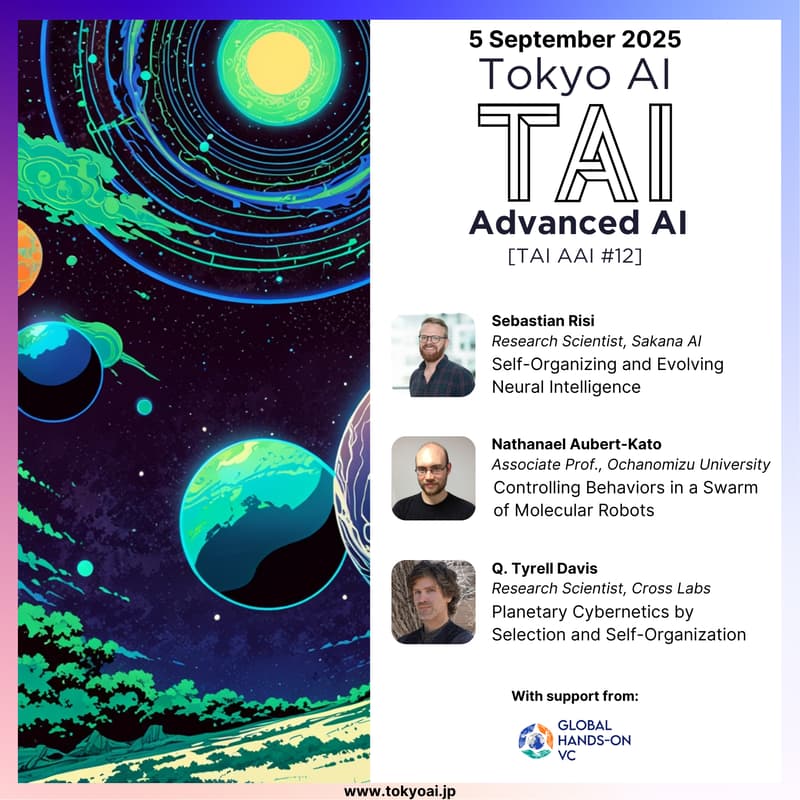

TAI AAI #12 - Evolutionary Algorithms
NOTE: As we are oversubscribed, registration is now closed. For next time, join our newsletter to know about our future events earlier: https://www.tokyoai.jp/subscribe
Join us for an evening to explore the world of evolutionary algorithms, hosted by Tokyo AI (TAI)'s Advanced AI (AAI) group.
Agenda
18:00 - 18:30 Doors Open
18:30 - 18:40 Introduction
18:40 - 19:10 Self-Organizing and Evolving Neural Intelligence (Sebastian Risi)
19:10 - 19:40 Controlling Behaviors in a Swarm of Molecular Robots (Nathanael Aubert-Kato)
19:40 - 20:10 Planetary Cybernetics by Selection and Self-Organization (Q. Tyrell Davis)
20:10 - 21:00 Networking
Speakers
Sebastian Risi
Title: Self-Organizing and Evolving Neural Intelligence
Abstract: Despite recent advances, current AI systems often remain brittle, failing when confronted with the unexpected. By drawing on the principles of self-organization and evolution, we are developing neural networks that adapt their weights in unforeseen situations, machines that recognize their own shape or damage, and cellular systems that self-assemble instead of relying on human engineering. In this talk, I will present some of our key works in this direction, highlighting how meta-learning developmental and generative models could be a path towards more resilient, adaptive, and autonomous AI
systems.
Bio: Sebastian Risi is a research scientist at sakana.ai and a professor at the IT University of Copenhagen where he directs the Creative AI Lab. As one of the pioneers in the emerging field of collective intelligence for deep learning, he investigates how we can make current AI approaches more robust and adaptive. He has won several international scientific awards, including multiple best paper awards, an ERC Consolidator Grant in 2022, the Distinguished Young Investigator in Artificial Life 2018 award, a Google Faculty Research Award in 2019, and an Amazon Research Award in 2020. His interdisciplinary work has been published in major machine learning, artificial life, and human-computer interaction conferences.
Nathanael Aubert-Kato
Title: Controlling Behaviors in a Swarm of Molecular Robots
Abstract: Molecular robotics is a recent field that utilizes molecular structures and interactions to implement all elements required to build a robot (body, actuation, sensing, computation) at the molecular level. While individual robots are typically limited in capabilities, their scale allows for the creation of millions of units, providing the scope for the emergence of more complex behaviors. The challenge then lies in developing controllers for the robots, despite the extremely non-linear nature of their interactions. In this talk, I will provide an introduction to molecular robotics, then focus on the application of evolutionary optimization and machine learning to develop molecular swarm controllers.
Bio: Nathanael Aubert-Kato is an Associate Professor at Ochanomizu University in Tokyo, Japan. His research interests cover molecular robotics, artificial life, and evolutionary optimization. Over the past ten years, he has been working on the implementation and optimization of complex systems at the molecular scale for the emergence of global behaviors.
Q. Tyrell Davis
Title: Planetary Cybernetics by Selection and Self-Organization
Abstract: Open-ended evolution is a concept currently without consensus definition, but a highly sought objective nonetheless. The lack of clear definition makes declaring success both easy and unsatisfying; most would agree that where some proposed conditions have technically been met in simulation, the results lack something essential found in the complexity and diversity of life on Earth. Unlike natural evolution, most applications of evolutionary strategies and simulations are not self-contained. Fitness, selection, reproduction and mutation in simulation are typically applied exogenously and/or ad hoc. In the natural evolution leading to humans, on the other hand, selection emerges from lower-level chemistry and physics, and the rest follows. Cellular automata provide a compelling substrate for intrinsic evolution to emerge, but even with recent developments in partial differential equation cellular automata (PDE CA) systems, innovation typically and quickly plateaus. Perhaps one element lacking in the intrinsic evolution of CA PDEs is the lack of existential forcing, such as imposed by the steady increase in Solar output incident on Earth over geological time scales. This work outlines a line of inquiry bringing together PDE CAs as promising models of self-organization with self-contained physics, and selection as a distributed planetary control system in the tradition of DaisyWorld biogenic climate models. Outcomes of interest include suggestions for observational strategies in the search for signs of exoplanetary life, insights into planetary boundaries for habitability, and, potentially, improved understanding of the relationship between selection and the evitability of mass catastrophe.
Bio: Q Tyrell Davis is a Research Scientist at Cross Labs in Kyoto, Japan, currently studying self-organization and the role of selection in planetary habitability. Tyrell conducted his PhD research on optical tweezers and inverse problem phase microscopy as a Marie Curie Fellow at the University of Dundee, and has been a researcher at Universität Tübingen, University of Oxford, and University of Vermont. Tyrell led machine learning projects at a thimbleful of startups and builds educational resources for inter-discipline-curious students.
Tokyo AI (TAI) information
TAI is the biggest AI community in Japan, with 2,700+ members mainly based in Tokyo (engineers, researchers, investors, product managers, and corporate innovation managers). Web: https://www.tokyoai.jp/
Organizers
Kai Arulkumaran: Research Scientist at Sakana AI, working on biologically-inspired intelligence, and Visiting Researcher at Araya, working on brain-controlled robots as part of the JST Moonshot R&D program. Previously, he completed his PhD in Bioengineering at Imperial College London and had work experience at DeepMind, FAIR, Microsoft Research, Twitter Cortex, and NNAISENSE. His research areas are deep learning, reinforcement learning, evolutionary computation, and computational neuroscience.
Craig Sherstan: Research Scientist at Sony AI Tokyo. His current research is on the application of RL to create AI opponents for the video game Gran Turismo. Previously, he completed his PhD in Reinforcement Learning at the University of Alberta, Canada as part of the Bionic Limbs for Improved Natural Control Lab. Craig has past experience working with human-computer interfaces, robotics, and various software industries.
Ilya Kulyatin: Fintech and AI entrepreneur with work and academic experience in the US, Netherlands, Singapore, UK, and Japan, with an MSc in Machine Learning from UCL.